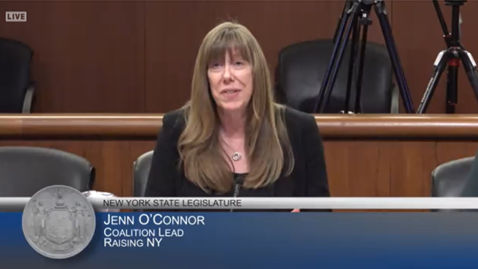January 31, 2024
Jenn O’Connor, Director of Partnerships and Early Childhood Policy for The Education Trust–New York
Hello and thank you for allowing me to testify before you today. My name is Jenn O’Connor and I am the Director of Partnerships and Early Childhood Policy for The Education Trust–New York (Ed Trust–NY). Ed Trust–NY is a statewide non-profit organization dedicated to educational equity. We work to attain educational justice through research, policy, and advocacy that results in all students – especially those who are from low-income backgrounds or students of color – achieving at high levels from early childhood through college completion.
Ed Trust–NY coordinates the Raising NY coalition, a diverse statewide coalition of parent, early childhood, education, business, and health organizations dedicated to supporting the learning potential of all children, with a focus on improving long-term outcomes for infants and toddlers who are low-income, children of color, and other under-served groups. Education starts early — during the first 1,000 days (or three years) of a child’s life. New York State spends $23.9B on all early childhood programs, yet the bulk of that investment goes to prekindergarten, Medicaid, and Child Health Plus (CHP). Some programs that receive funding (like CHP and SNAP), serve children outside the 0-5 age range. Of that $23.9B, only $5.26B is spent on child care, family support, and prevention. Raising NY carries the policy agendas of several coalitions; many of those partners will testify today. I will focus my remarks on just a few of our highest-priority items. We urge the Legislature to:
Invest in the child care workforce. While the Executive Budget invests $1.8B to sustain expanded eligibility to child care assistance and $180M in leftover federal pandemic funding for one-time workforce retention bonuses, there is not an effort to support the workforce in a sustainable way. Among other initiatives, New York should prioritize the workforce and:
- Commit to long-term, sustainable investments in the child care sector that will provide competitive wages and benefits and increase equitable access to high-quality care for families, especially those in under-resourced communities;
- Expand access to child care assistance for all young children, regardless of immigration status, via state general funds;
- Adopt decoupling legislation (vetoed last year) that would separate a parents’ work hours from their eligibility for child care assistance, a policy change that would greatly support those working “nontraditional” hours or in the gig economy;
- Address the shortage of infant and toddler slots, which is the most expensive and staff-intensive, and therefore, difficult to meet the demand; and
- Support a move toward utilization of a cost estimation model, which would compensate providers/educators based on the true cost of providing child care. Ed Trust—NY, together with Prenatal to Five Fiscal Strategies, has developed such a cost model that can be used as a conversation starter.
Invest in programs/infrastructure that accelerate poverty reduction. When the federal government expanded the Child Tax Credit during the pandemic (2021), the child poverty rate fell to a historic low of 5.2%. When that expansion ended, the rate dramatically increased to 12.4%. Child tax credits work. New York should:
- Combine and expand the existing tax credits—specifically the Empire State Child Credit and the Earned Income Tax Credit (EITC)—into a Working Families Tax Credit so that they truly have an impact on family well-being.
Ensure that all children have access to home visiting. While we aim for the North Star of universally-offered home visiting, we must expand existing programs so that families who desire ongoing services have access to those services. The Executive Budget maintains funding for the Healthy Families NY, ParentChild+, and Nurse-Family Partnership programs. New York should:
- Increase appropriated funding for both ParentChild+ and the Nurse-Family Partnership program so that those programs can serve more families. Please note that the funding for ParentChild+ is merely a reappropriation, since the State has not released funding promised last year. Any attention to this issue would be greatly appreciated; and
- Support a move (like with child care) toward utilization of a cost estimation model, which would compensate home visitors based on the true cost of providing services. Ed Trust—NY, together with Prenatal to Five Fiscal Strategies, has also developed such a cost model for home visiting.
- Also, although not a home visiting program, Help Me Grow provides comprehensive, family-centered, primary prevention services that complement home visiting, and funding should be maintained. Again, any assistance the Legislature can provide to free up appropriated funding so that programs can expand as promised would be appreciated.
Because young children, particularly infants and toddlers, don’t grow in a vacuum, it is important to consider the other systems and supports around them. That is why we also support the NYS Network for Youth Success’s afterschool/extended day policy agenda and budget request, evidence-based investments in early literacy, continuous Medicaid coverage for children aged 0-6, and an 11% increase in Early Intervention rates. We will testify on those issue areas in subsequent hearings.
Thank you for allowing me to testify today on behalf of Ed Trust–NY. I look forward to working with you to appropriately invest in programs that will strengthen and support families.

